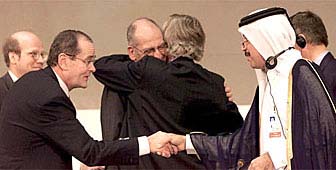Switzerland satisfied with outcome of WTO talks

Members of the World Trade Organisation, meeting in Qatar, have agreed to launch a new round of trade liberalisation talks. Switzerland has hailed the deal as a "historic result".
The accord, which was struck on Wednesday following six days of gruelling negotiations, includes an agreement on the contentious issue of access to medicines. It comes two years after differences between developing and rich nations led to the failure of a similar attempt in Seattle.
The accord, which was struck on Wednesday following six days of gruelling negotiations, includes an agreement on the contentious issue of access to medicines. It comes two years after differences between developing and rich nations led to the failure of a similar attempt in Seattle.
Row over patent protection
During the meeting, the Swiss delegation was particularly concerned about negotiations over patent protection and intellectual property rights.
The Swiss pharmaceutical industry, accused by critics of putting patents before patients, had argued that patent guarantees, outlined in the WTO’s intellectual property rights accord, known as Trips, should not be diluted.
During the negotiations, Switzerland and the United States backed a proposal for countries to be allowed to buy cheap copies of patented drugs only when faced with a health emergency.
Under the new agreement reached in Doha, strict WTO rules, guaranteeing drug patents for 20 years, can now be waived by countries which demonstrate a public health need.
The Swiss delegation at the talks, as well as representatives of Switzerland’s pharmaceuticals industry and international aid agencies, all welcomed the deal.
“We are very happy to have been able to reach an agreement on this matter because it is a very important issue,” the deputy head of the Swiss delegation Pierre-Louis Girard, told swissinfo.
Developing countries and international aid organisations said the deal would bring down the cost of remedies for treating diseases, which kill millions of poor people every year.
Clarifying ambiguous wording
The new text essentially clarifies ambiguous wording in the original intellectual property rights accord.
The agreement, which was first signed in 1994, asked all countries to grant 20 years patent protection in all fields of technology including new medicines. However, it did make allowances for special circumstances.
The text of the new deal specifically states that Trips “shall not prevent (WTO) members from taking measures to protect public health”.
“The deal is a political declaration and demonstrates the intention of all to assert the flexibility which the Trips agreement provides,” said Girard.
Ellen t’Hoen of Medecins sans Frontieres welcomed the breakthrough. “The agreement clearly states that public health should be considered more important than the protection of patent rights and, if patent rights stand in the way countries can now take measures to set them aside,” she told swissinfo.
Cautious welcome
Meanwhile, Thomas Cueni, director of Interpharma, which represents the Swiss pharmaceutical research companies, gave a cautious welcome to the deal.
“We are satisfied insofar as the declaration from Doha confirmed the importance of intellectual property protection for development and research of new medicines and the respect of patents is acknowledged.
“It also confirms that the Trips agreement as it is contains the necessary flexibility to address the public health crisis and particularly such in the area of communicable diseases such as HIV/Aids, tuberculosis and malaria.”
Cueni added that insufficient private and public funding generally and not drug patents were the obstacle to HIV treatment in Africa.
The row over patents had threatened to derail the WTO meeting, which was aimed at launching a new round of global free trade talks.
by Vincent Landon and Anna Nelson

In compliance with the JTI standards
More: SWI swissinfo.ch certified by the Journalism Trust Initiative
You can find an overview of ongoing debates with our journalists here. Please join us!
If you want to start a conversation about a topic raised in this article or want to report factual errors, email us at english@swissinfo.ch.